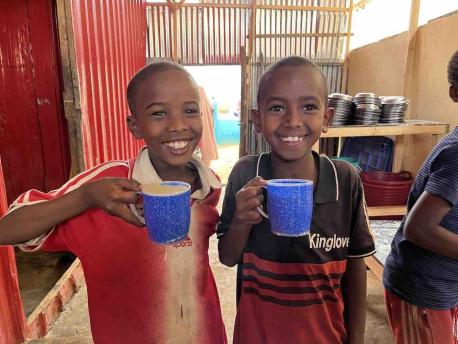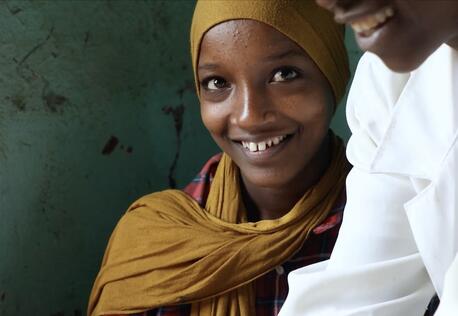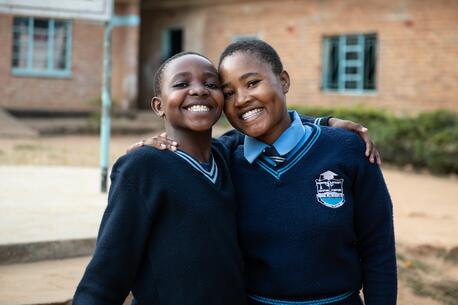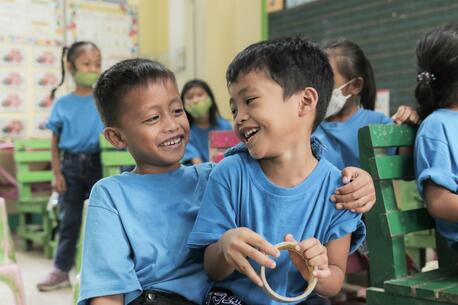
Children's Rights
Respect for children includes respecting their rights as established in the Convention on the Rights of the Child — an international treaty that underpins everything UNICEF does.
Core to UNICEF's mission: safeguarding child rights
The Convention on the Rights of the Child, the most widely ratified human rights treaty, recognizes the fundamental human dignity of all children and the urgency of ensuring their well-being and development. The treaty makes clear that a basic quality of life should be the right of all children everywhere remains a guiding force behind UNICEF's mission.
Upholding CRC principles has never been more urgent.
UNICEF and the CRC: transforming children’s lives around the world
UNICEF works in over 190 countries and territories to defend children's rights in a number of ways. With UNICEF's help, and inspired by the CRC, governments have changed laws and policies and made investments so that more children could get what they need to thrive and reach their full potential. There are stronger safeguards in place to protect children from violence and exploitation. And more children are having their voices heard and are finding opportunities to participate in their societies.
Despite all this progress, the CRC, which came into force in 1990 and has 196 signatory countries, is still not fully implemented or widely known or understood. Millions of children continue to suffer violations of their rights when they are denied adequate health care, nutrition, education and protection from violence. Childhoods continue to be cut short when children are forced to leave school, flee disasters, do hazardous work, get married or fight in wars.
And there are more children in need of humanitarian assistance today than at any other time since World War II. Across the globe, children and their families are facing a deadly mix of crises, from conflict, natural disaster and displacement to disease outbreaks and soaring rates of malnutrition. Meanwhile, climate change is making these crises worse and unleashing new ones.
Any threat to a child’s rights is a threat to their future — and the future of the societies in which they live. The course of their development will determine their contribution—or cost—to society over the course of their lives.
A global commitment to protecting kids' rights to survive and thrive
Making sure children know their rights — and working to ensure these rights are upheld — factors into everything UNICEF does, including efforts to end child marriage, child labor, child trafficking and the forced recruitment of child soldiers. It is the driving force behind UNICEF's efforts to get children back to school and to keep them there and on track to a better future.
Here is a closer look at some of the rights affirmed by the CRC, and how they relate to UNICEF's work.
Every child has the right to food, water and shelter
Children have the right to clean water to drink, healthy food and a clean and safe environment to live in. From war in Ukraine to earthquakes in Turkey and Syria to severe drought in the Horn of Africa, the numbers of displaced people has never been higher.
Families on the move need help accessing basic necessities like shelter and clean water. At points along Ukraine’s border, for example, UNICEF and UNHCR are providing that and more at “Blue Dot” safe spaces — support hubs offering children and their families a range of services. They are also able to identify unaccompanied and separated children and ensure their protection.
Every child has the right to be healthy
Children have the right to the best health care possible. Because they are still developing, children are especially vulnerable to poor living conditions such as poverty, inadequate health care, malnutrition and environmental pollution. UNICEF works to strengthen health systems to deliver integrated services for children, adolescents and women of reproductive age. It also provides vital health services in humanitarian emergencies.
Every child has the right to be safe
Governments must protect children from violence, abuse and neglect. Whether fleeing war and violence, poverty, exploitation or natural disaster, every child— especially the youngest and most vulnerable — has the right to grow up in a safe and inclusive environment and should not have to forfeit their childhood.
This right to safety applies to the digital world. UNICEF is working to protect children virtually by highlighting the importance of child rights-based policies and practices that strike the delicate balance between protecting children from online risks while still allowing them to access the Internet and leverage its benefits.
Every child has the right to learn
Every child has the right to an education, one that should help them fully develop their personalities, talents and abilities. It should teach them to understand their own rights, and to respect other’s rights, cultures and differences. UNICEF works around the world to support quality learning for every girl and boy, especially those in greatest danger of being left behind. After catastrophic flooding in Pakistan, for example, UNICEF set up Temporary Learning Centers for students whose schools had been damaged or destroyed.
A child’s rights as a refugee
The CRC stipulates that children who seek refuge in another country should get help and protection and have the same rights as children born in that country. When families flee war, economic collapse, earthquakes and other natural disasters, children’s lives are turned upside down. Many experience, fear, uncertainty and emotional turmoil during their journey, along with threats to their safety and well-being.
UNICEF works with partners to provide supplies and support to child migrants and refugees and other children on the move to help safeguard their rights, no matter where they are or where they are from.
Children have the right to be heard
Kids should have a voice, especially on issues that are important to them and that impact them directly. Without special attention on their opinions, children's views go unheard.
UNICEF has been stepping up its engagement with children and young people as resources who have unique knowledge of their own and their communities’ circumstances, needs and concerns, and as problem solvers and agents of change who have good ideas and can contribute to innovative solutions.
With support from UNICEF and others, the children and young people of today are taking the lead on demanding urgent action, and empowering themselves to learn about and to shape the world around them, bringing hope for the future.
UNICEF provides channels for youth communication and direct consultation, platforms like Voices of Youth — a digital community dedicated to amplifying youth voices — and U-Report, a mobile platform with nearly 727,000 users in over 100 countries.
There are engagements around climate action — global forums where children and young people have an opportunity to speak to government leaders and other stakeholders and voice their demands.
And UNICEF's Youth on the Move Fellowship program provides opportunities for young people from refugee and displaced backgrounds and from different nationalities to work with UNICEF country offices and teams.
Learn more about UNICEF's mission for children.



